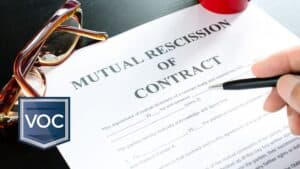Here at Vacation Ownership Consultants, we spend a lot of time educating consumers on the potential pitfalls of timeshare ownership. Even though we specialize in ending owner obligations, our goal has always been to help buyers fully understand and properly manage their perpetual product. So today, we wanted to shed some light on the extra “baggage” that usually comes with a supposed timeshare bargain.
Whether you’re new to timeshare travel or you’ve bought a weekly interval in the past, the presentation of the product can be extremely misleading. In fact, many of the stories we’ve covered involve experienced owners and the entrapment of conditional offers, upgrades, points programs and outrageous debt. That’s not to mention the scams in our own industry. No matter how appealing a timeshare offer may sound, you must do the research yourself before coming to a logical conclusion.
A Brief Overview of an Alleged Timeshare Bargain:
Timeshares are not your average travel experience. What you’re buying into isn’t just a vacation package. It’s going to be a mortgaged obligation for the next decade or so – supposing you can avoid signing up for anything else over this span of time. Despite there being no equity in the product, you’re still responsible for resort costs. Maintenance fees are constantly rising and timeshare assessments may become more frequent as the pandemic ensues. Interest rates aren’t exactly kind to vacation owners either.
The point is, if you take the time to assess a timeshare bargain, it’s not much of a deal after all. Although it may only be presented as a $20K loan, the overall cost may more than double over a 10 year repayment term. It’s not just going to be a few hundred dollars a month. What happens if you face a financial hardship or are unable to consistently make payments? The binding agreement holds buyers accountable for everything. Just know these things before you make the financial commitment.

So What Type of Baggage Does the Timeshare Purchase Carry With It?
With all of that being said, the most troubling thing about a timeshare bargain is the simple fact that pertinent terms and contract information is commonly hidden from interested buyers. Many aren’t even aware they only have a few days to inspect the purchase before the contract is final. This in itself should be concerning.
Like we mentioned before, a timeshare isn’t exactly a small chunk of change. Whether it’s presented as a smokin’ deal or not, buyers choose to spend a lot of money on something that’s rather vague. Because of this, many end up assuming certain perks come with the product. Things like exchanging packages, reselling the product or refinancing the mortgage are normally believed to be included or easily obtainable.
As you can imagine, improper disclosure leads to a number of problems. By the time owners experience the level of customer service their timeshare bargain comes with, many give up on their efforts to make it worthwhile. Those that attempt to improve their experience often find themselves with even more “baggage” to carry. Some of which find themselves caring too much.
1. Carry-on With a Travel Club Membership.
One of the biggest misconceptions about vacation ownership is that resort availability is first class and vast. Because of the number of dishonest verbal promises spewed during the sales presentation, far too many buyers think their membership provides them with certain perks that common travelers don’t receive. In reality, most owners end up struggling to book desired locations during ideal times of year.
What Leads Buyers to Upgrading their Purchase?
Unfortunately, many timeshare resorts give retail travelers first dibs on premium real estate during peak seasons. Why would they let contractually bound customers reserve all of their high priced inventory? While a salesperson may have communicated extensive availability, the contract is what matters. If there’s no language regarding the false pretenses of the presentation, then there’s not much you can do.

Those that don’t decide to cancel or take legal action usually look into another timeshare bargain the resort sends their way. One of the first “baggage claims” (if you will) tends to be a travel club membership. At the end of the day, owners are forced to sign another contract and put down a large lump sum in order to expand their booking capabilities. Enhancement products like this give timeshares an ability to continue offering “bargains” at the buyer’s expense.
Funneling consumers into these types of decisions is intentional. Once an owner is bound to multiple contracts, travel limitations rarely remain their primary concern. Although vacation ownership may seem like an affordable experience, it can be somewhat of a mirage. In fact, annual fees, upgrades and travel clubs aren’t the only way they go about milking their timeshare members.
2. Suitcases Full of Exchange Memberships.
Unlike availability concerns, some timeshare owners know they may end up exchanging their current product for something else. The problem is, most are led to believe the process is an easy one. Similar to inventory assumptions, some even believe exchanges are included in their timeshare bargain. But they most certainly are not.

As a matter of fact, most timeshare companies process these requests through third companies such as RCI, Interval International, SFX and similar. Even if you hired your own agency, there’s a fraud risk. A number of fees are required to process an exchange and most owners find it difficult to receive a product of equal value.
While you may obtain something that’s more suitable, odds are you’ll have a desire to upgrade with another enhancement. Sadly, a good number of owners buy the product and make multiple exchanges before realizing the purchase was a bad idea. Every attempt to improve the experience only increases the price tag. The more you look into the industry, the more you may come to the conclusion that a true timeshare bargain doesn’t exist.
3. Credit Cards Are Like a Luggage Carrier.
When you think about it, the institutions that finance timeshare owners are one of the most disguised elements of the sale. Aside from prospects being told they can refinance their mortgage at later dates (despite a refusal by almost all banks to do so), credit cards are often opened in their name to aid with costs. In some cases, this has even occurred without the buyer’s knowledge or consent.
Oftentimes, these credits cards are used to cover down payments to lessen the initial burden. In other cases, they’re used to pay for mortgage payments or yearly dues automatically – which creates quite the problem when buyers aren’t aware of both. Some owners even have to eventually use the card to make unexpected payments they can’t afford. It’s a fail safe that only adds baggage to the timeshare bargain.

Should Timeshares Be Offering Credit to Begin With?
Owners that aren’t properly educated on credit card management may even take advantage of the high spending limits (sales agents have been known to lie on credit applications). If usage isn’t properly explained then these cards could be used to cover other expenses or unnecessary travel items.
Rewards, when applicable, also tend to incentivise holders to use it more often than they should. High interest rates and loose spending is a recipe for disaster. If an owner is struggling to keep up with their payments, it only enables them to further the overall deficit. Paying a high interest loan with a high interest credit card from Barclays or Comenity Bank may be an owner’s last ditch effort to try to avoid foreclosure.
4. Toting Certificate Incentives Are Risky.
The last form of baggage that we’re covering today has to do with what we call, “hooked” and “unhooked” premiums. It wouldn’t be quite the timeshare bargain if your new timeshare company didn’t sell you out to another conglomerate. In these scenarios, buyers are given the opportunity to stay at another resort (usually 2 nights) and only pay for the taxes. The “free” perk not only helps sales reps close the deal but it distracts buyers from the rescission period.

While a “free” trip may be exciting, the future host is almost always simply looking to sell a timeshare contract too. A certificate program basically puts you through another aggressive sales pitch about the resort. The resort will have nothing to lose and your current timeshare company could care less. From the front desk to dinner arrangements, guests can expect to be met by a staff that’s eager to close the deal.
Since so many timeshare owners are initially clueless to what they’ve gotten themselves into, another presentation can be extremely misleading. If further gifts and incentives intrigue them, then they may find themselves in another binding agreement that’s less than advantageous. In short, what may be seen as a can’t miss timeshare bargain can easily become an unforgettable experience.
Travel Light With Confident Travel Decisions.
Whether the economy opens up anytime soon or not, timeshare companies are reeling from their profit losses over the past 8 months. Most of their sales force has been depleted. American consumers have to be keen on the types of tactics they use to convince people to hand over thousands of dollars. Within hours of a vacation, you could easily find yourself under a lifetime travel commitment you can’t even use.
Understanding what questions to ask and where to look for information can help you avoid the pitfalls of an alleged timeshare bargain. If you’ve determined that you’ve been a victim of a dishonest scheme and feel trapped in your agreement, our consultants are standing by. Like we mentioned before, whether you qualify for our service or not, we’d love a chance to point you in the right direction.






